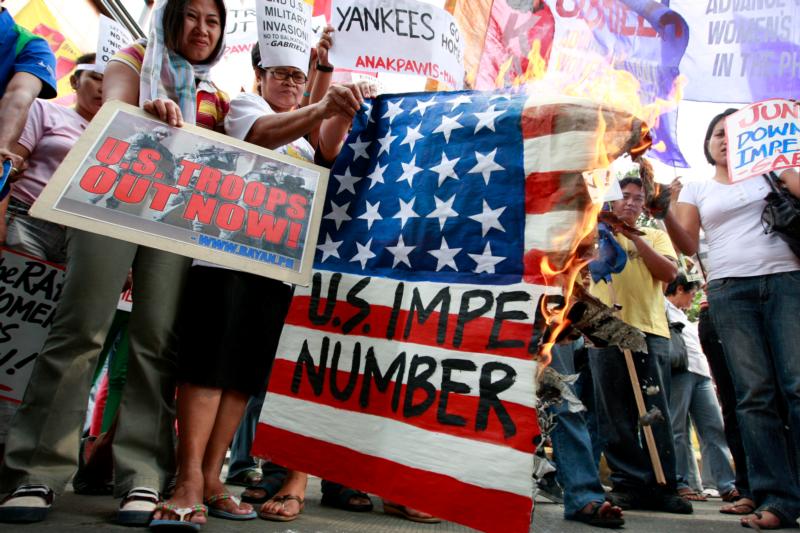
Filipinos protest joint military exercises with the U.S. in Manila, in this Feb. 4, 2009, file photo. Several Philippine bishops express opposition to the planned building of U.S. military facilities in five Philippine provinces in the coming months. (CNS photo/Dennis M. Sabangan, EPA)
by Catholic News Service
MANILA, Philippines (CNS) — Several Catholic bishops have expressed opposition to the planned building of U.S. military facilities in five Philippine provinces in the coming months.
“U.S. military bases in the country will create more problems than solutions,” said Bishop Roberto Mallari of San Jose in Nueva Ecija province. One of the facilities will be built in Mallari’s diocese under the 2014 Enhanced Defense Cooperation Agreement between the United States and Philippines, reported ucanews.com.
Bishop Mallari said the agreement carries “unfair provisions” that allow the U.S. increased military presence in the country through the rotation of troops and military assets for so-called humanitarian and naval security operations.
In the central Philippines, Bishop Pedro Arigo of Palawan warned that the installation of a U.S. military facility in the province might aggravate tension between China’s maritime forces and Filipino fishermen, ucanews.com reported.
Bishop Arigo admitted that fishing communities in Palawan have been calling for a stronger military presence for protection from Chinese forces in disputed territories.
“[Because] our own government is incapable of providing a strong military support … many Palawan residents will take [the arrival of the Americans] as necessary evil,” said Bishop Arigo.
The Philippines and the U.S. have identified five Philippine military facilities — the Antonio Bautista Air Base in Palawan, Fort Magsaysay in Nueva Ecija, Lumbia Airport in Cagayan de Oro, Mactan-Benito Ebuen Air Base in Cebu, and Basa Air Base in Pampanga — where the Americans can also build their bases.
Bishop Mallari said the church “fears an increase in human rights violations” with the entry of American soldiers.
In 2014, an American serviceman was accused of killing a transgender woman who was on shore leave in Subic Bay, a former American naval base.
Bishop Arigo said the church “should find a way to help prevent . . . the imminent increase of rape incidents and prostitution.”
“Aside from human rights violations, military bases will generate drug problems, increase in HIV and AIDS cases, and prostitution,” Bishop Arigo said.
The Philippine government has called for support for the military deal, saying it “reaffirms the shared commitment” of the Philippines and the United States to ensure mutual defense and security.
Foreign Affairs spokesman Charles Jose said the presence of U.S. troops will “improve the country’s efforts on humanitarian assistance and disaster response.”
Bishop Mallari, however, said instead of inviting foreign military forces, the Philippine government should focus on “improving its military capabilities.” He said the military deal will not improve or modernize the country’s armed forces but only favors U.S. interests in Southeast Asia.






